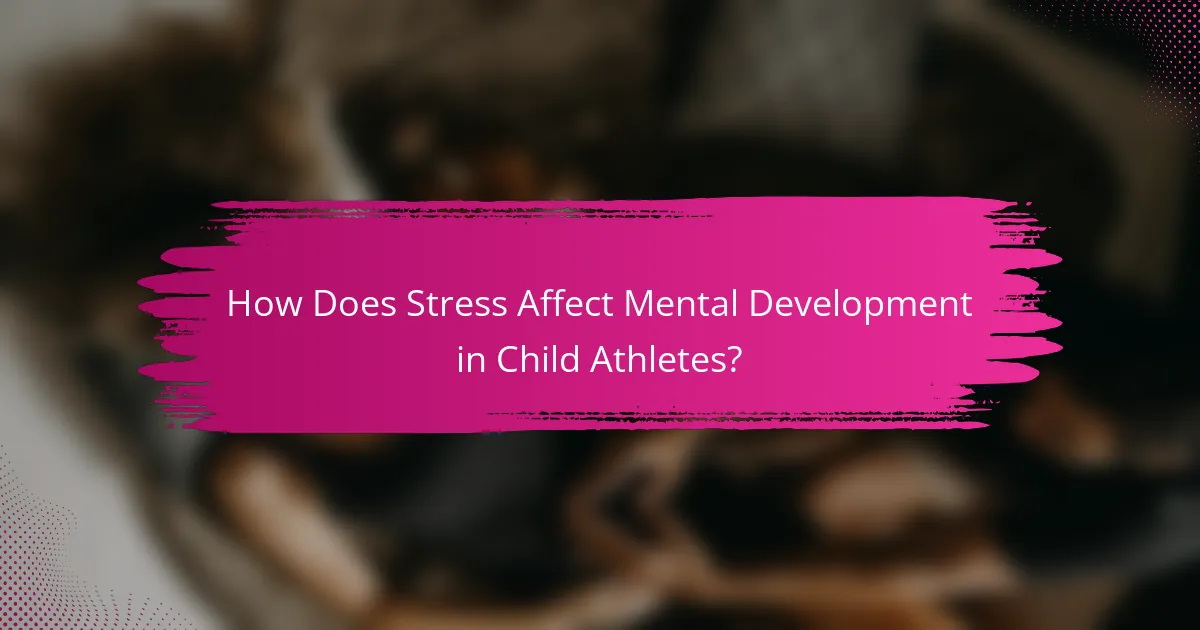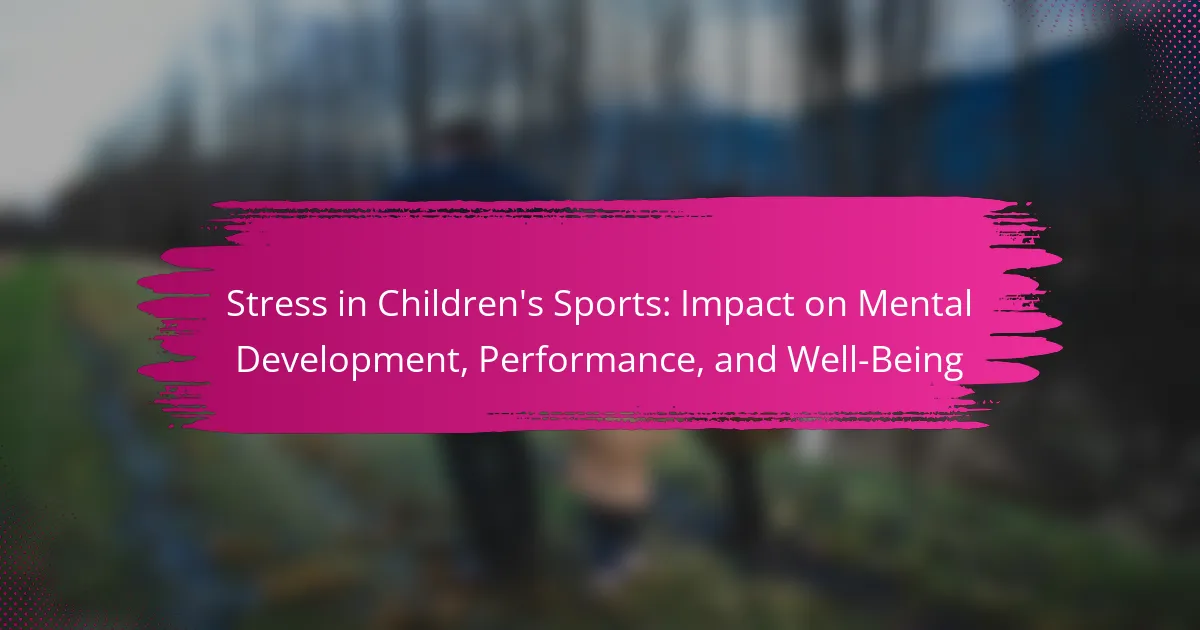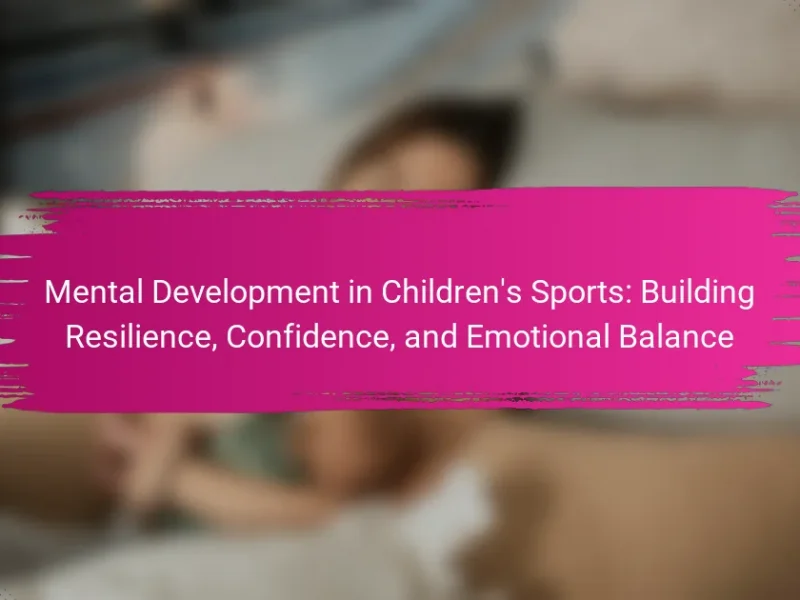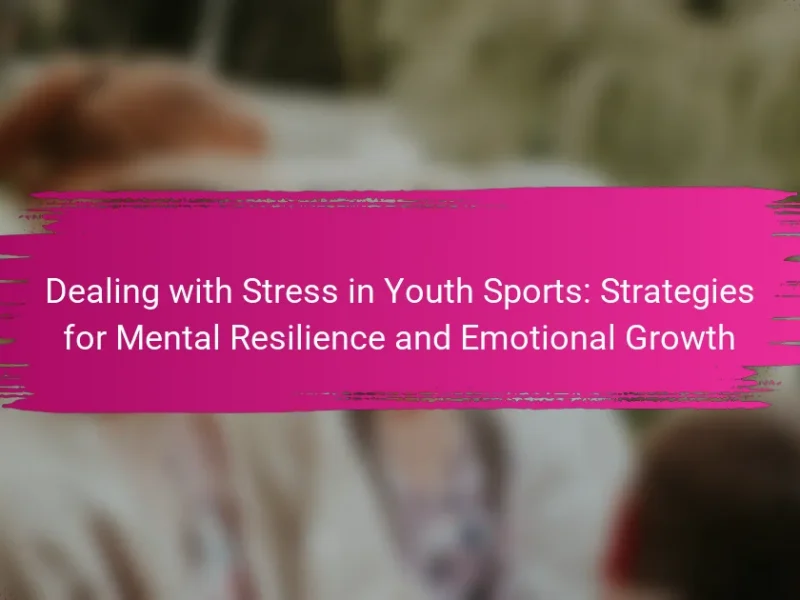Stress in child sports can significantly hinder mental development, performance, and overall well-being. High stress levels lead to anxiety, decreased focus, and impaired decision-making. Recognising signs of stress is essential for parents and coaches. Effective strategies like mindfulness training and open communication can promote healthier mental growth in young athletes.

How Does Stress Affect Mental Development in Child Athletes?
Stress negatively impacts mental development in child athletes by hindering cognitive functions, emotional regulation, and overall well-being. High levels of stress can lead to anxiety, reduced focus, and impaired decision-making, affecting performance. Studies indicate that chronic stress may disrupt neural development, potentially leading to long-term psychological issues. Effective stress management techniques, such as mindfulness and supportive coaching, can mitigate these effects and promote healthier mental growth in young athletes.
What are the Common Sources of Stress in Children’s Sports?
Common sources of stress in children’s sports include pressure to perform, fear of failure, and parental expectations. These factors can negatively impact mental development, performance, and overall well-being.
1. Pressure to perform: Children often feel compelled to excel, leading to anxiety.
2. Fear of failure: The concern about disappointing coaches or teammates can create significant stress.
3. Parental expectations: High expectations from parents can increase pressure and affect children’s enjoyment of the sport.
4. Competition: Intense rivalry can lead to heightened stress levels among young athletes.
5. Time commitment: Balancing sports with academics and social life can overwhelm children.
6. Injuries: The fear of injury can also contribute to anxiety in sports settings.
How Does Stress Impact Performance in Young Athletes?
Stress negatively affects performance in young athletes by impairing focus, reducing motivation, and increasing anxiety. High levels of stress can lead to decreased physical performance and hinder mental development. Research shows that young athletes experiencing stress may struggle with decision-making and teamwork. Managing stress through supportive environments can enhance well-being and performance.
What Are the Long-Term Effects of Stress on Mental Well-Being?
Long-term stress negatively impacts children’s mental well-being, leading to anxiety, depression, and reduced cognitive function. Chronic stress can hinder emotional regulation and social skills, affecting overall performance in sports and academics. Research indicates that children exposed to high stress levels may experience impaired memory and attention, which can diminish their athletic capabilities and personal development. Effective stress management strategies are essential for fostering resilience and promoting healthier mental states in young athletes.

What Are the Universal Signs of Stress in Child Athletes?
Child athletes often exhibit universal signs of stress, including anxiety, irritability, and decreased performance. These symptoms can impact their mental development and overall well-being.
Common indicators of stress in child athletes involve changes in behaviour and emotional responses. For instance, they may show reluctance to participate in sports, experience sleep disturbances, or express feelings of overwhelm.
The effects of stress can lead to a decline in athletic performance. Research indicates that high levels of stress can impair focus and motivation, ultimately affecting training outcomes and competition results.
Recognising these signs early is crucial for parents and coaches. Addressing stress can help maintain mental health and enhance the overall sports experience for child athletes.
How Can Parents Identify Stress Symptoms in Their Children?
Parents can identify stress symptoms in their children through behavioural changes and emotional signs. Common indicators include withdrawal from activities, changes in mood, and physical symptoms like headaches or stomachaches. Monitoring academic performance and social interactions can also reveal stress levels. Recognising these signs early can help parents support their child’s mental development and overall well-being.
What Behavioural Changes Indicate Stress in Young Athletes?
Behavioural changes indicating stress in young athletes include increased anxiety, withdrawal from activities, and changes in sleep patterns. These changes can significantly impact their mental development and overall well-being. Young athletes may exhibit signs such as irritability, decreased motivation, and difficulty concentrating. Recognising these behaviours is crucial for timely intervention to support their mental health and athletic performance.

What Unique Strategies Can Mitigate Stress for Child Athletes?
Child athletes can effectively mitigate stress through unique strategies such as mindfulness training, structured routines, and open communication. Mindfulness practices help improve focus and emotional regulation. Establishing structured routines provides a sense of stability and predictability. Encouraging open communication fosters trust and allows children to express their feelings, reducing anxiety. These approaches not only enhance performance but also promote overall well-being in young athletes.
How Can Coaches Create a Supportive Environment?
Coaches can create a supportive environment by fostering open communication and understanding individual needs. Encouraging teamwork and recognising effort enhances children’s confidence and reduces stress. Establishing clear expectations helps children focus on personal growth rather than competition. Providing constructive feedback promotes resilience and a positive mindset.
What Role Does Positive Reinforcement Play in Reducing Stress?
Positive reinforcement significantly reduces stress in children involved in sports by enhancing their motivation and self-esteem. Recognising achievements, no matter how small, fosters a positive environment that encourages persistence and reduces anxiety. This approach leads to improved mental development as children learn to associate effort with success. Research indicates that athletes who receive consistent positive feedback demonstrate better performance and overall well-being. By creating a supportive atmosphere, coaches and parents can help mitigate stress and promote healthy emotional growth in young athletes.

What Are the Rare but Notable Effects of Stress on Team Dynamics?
Stress can significantly disrupt team dynamics in children’s sports, leading to rare but notable effects. One effect is decreased collaboration, as stress can make young athletes more focused on individual performance rather than teamwork. Another rare impact is heightened competition among peers, which can foster unhealthy rivalries. Additionally, stress may lead to emotional outbursts, disrupting group cohesion. These effects can ultimately hinder mental development and well-being, showcasing the importance of managing stress in youth sports environments.
How Can Stress Influence Relationships Among Teammates?
Stress can significantly affect relationships among teammates by creating tension and reducing communication. High stress levels can lead to misunderstandings, decreased collaboration, and lower overall morale. As a result, teammates may become less supportive of one another, impacting team dynamics and performance. Effective stress management strategies can foster a more cohesive and positive team environment, enhancing both individual well-being and group effectiveness.
What Unique Challenges Do High-Pressure Sports Create?
High-pressure sports create unique challenges that can negatively affect children’s mental development and well-being. These challenges include heightened anxiety, performance pressure, and fear of failure. As a result, children may experience stress that hinders their enjoyment of the sport and overall mental health. Research indicates that 30% of young athletes report significant stress levels during competitions, which can lead to burnout and withdrawal from sports altogether. Furthermore, the competitive environment may overshadow the importance of skill development and teamwork, impacting their long-term engagement in physical activities.

What Best Practices Can Parents Implement to Support Their Children?
Parents can support their children in sports by fostering a positive environment that minimises stress. Encouraging open communication allows children to express their feelings about competition. Setting realistic expectations helps children focus on enjoyment rather than solely on performance. Teaching stress management techniques, such as mindfulness or breathing exercises, can enhance mental resilience. Finally, celebrating effort and improvement, rather than just outcomes, nurtures a healthy attitude towards sports participation.
How Can Parents Encourage Healthy Coping Mechanisms?
Parents can encourage healthy coping mechanisms by promoting open communication and providing emotional support. Engaging in active listening helps children express their feelings about stress in sports. Teaching problem-solving skills empowers children to manage challenges effectively. Encouraging physical activity outside of sports can also alleviate stress. Mindfulness practices, such as deep breathing or meditation, foster resilience. Setting realistic expectations prevents undue pressure, enhancing mental development and well-being.
What Are the Common Mistakes to Avoid When Addressing Stress?
To effectively address stress in children participating in sports, avoid common mistakes that can exacerbate their mental strain. Prioritise open communication, ensuring children feel safe expressing their feelings. Avoid placing excessive pressure on performance, as this can lead to anxiety and burnout. Recognise the importance of balance; encourage participation for enjoyment rather than solely for competition. Lastly, be mindful of your own reactions; modelling healthy coping strategies can positively influence children’s stress management.
How Can Communication Improve Mental Well-Being in Young Athletes?
Effective communication enhances mental well-being in young athletes by fostering trust, reducing anxiety, and improving performance. Open dialogue allows athletes to express feelings, leading to better emotional regulation. Studies show that supportive communication from coaches and parents correlates with increased self-esteem and resilience. Furthermore, athletes who engage in regular discussions about their experiences report lower stress levels and improved focus during competitions.


